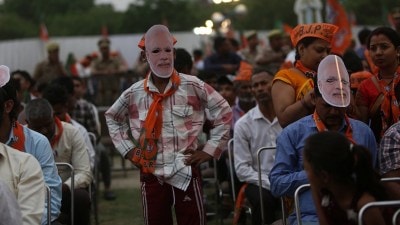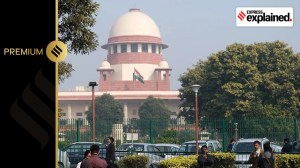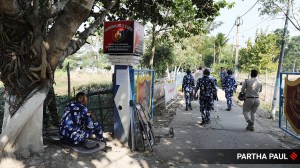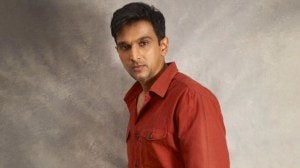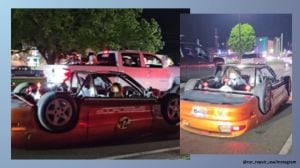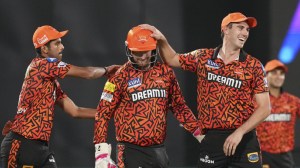- India
- International
In Srinagar, PM connects — with those who aren’t exactly the aam flood victim aadmi
Those who met the PM Narendra Modi at the Raj Bhawan were 'the elite'.
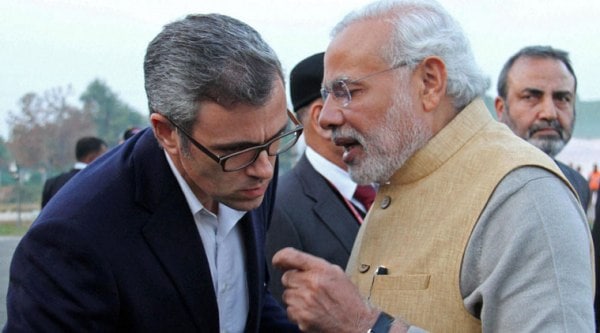 None of the individuals who met the PM at Raj Bhawan could stand in for the missing aam aadmi.
None of the individuals who met the PM at Raj Bhawan could stand in for the missing aam aadmi.
Yesterday afternoon, Prime Minister Narendra Modi came here to reach out to the flood-affected and spent a few hours in Raj Bhawan where he met several delegations, political and non-political, behind closed doors. The day after, the Diwali touchdown raised a question: did a gesture that promised reassurance from a BJP-led Centre at a time when the Valley is struggling to cope with the aftermath of unprecedented floods bypass those most bruised by the devastation?
It’s an old problem in Kashmir, the inability of the Centre to find “the people” to strike a real or meaningful conversation with. This is the site, after all, of messages lost in translation in choreographed meetings with handpicked “representatives” and packages and gestures handed out unseeingly.
Prime Minister Modi’s visit, in the way it played out, may have ended up reinforcing an older opaque pattern.
The onset of winter is the most daunting problem for those whose homes and livelihoods were washed away in the floods or destroyed by the water that remained standing in the city for agonising days after that. To the continuing crisis of sanitation, ration distribution, irregular electricity and collapsed systems of health care, will be added the challenge of reaching bedding and warm clothes, kerosene and gas to people living in makeshift shelters or tentatively putting up in homes of relatives and friends.
But it is safe to say that none of the individuals who met the PM at Raj Bhawan on Thursday — most of whom represent business, professional, and civil society associations and organizations and had received calls from officials of the district administration to present themselves for an audience with the PM just the night before — are among those for whom the approach of winter is now a spectre most urgent and terrifying.

By all accounts, nor could they stand in for the missing aam aadmi as they highlighted sector-specific concerns, the need for setting up new mechanisms and committees and reiterated old identity issues. In fact, after it was all over, several rued the fact that the concerns of the most affected were missing from the interaction with the PM.
“I told the prime minister that there is no Modi effect in Kashmir, inspite of his visits to J&K, in the same way that Vajpayee left an impact, or Morarji Desai”, said Prof Gulwani, head of the Institute of Islamic Studies at Kashmir University. “As a student of state politics, I feel there is a need to revive the ministry of Kashmir affairs in Delhi in the 1990s, we need an institutional mechanism. A shattered economy at a time of a youth bulge is also a cause for worry.”
His own concerns seemed esoteric but Gulwani lamented that those who met the PM at the Raj Bhawan were “the elite”. He asked: “Is anyone listening to the person who has lost his job and his home?”
Nisar Ali, former professor of economics at Kashmir University, said his main concern was the “power bottleneck” for the J&K economy. In this context, he had had the opportunity, he said, to discuss the recommendations of the C. Rangarajan Committee on the state’s compensation and claims with former Prime Minister Manmohan Singh as well. “I started on this subject with PM Modi. I told him that job creation would only be possible if the Rangarajan report was implemented. The PM said that right now I want your view on the floods…”’
Mohammad Yousuf, a transporter with the Kashmir Motor Driver Association, said he told the PM that since 2005, when the government enforced a High Court order on phasing out old vehicles, the transport industry has been under siege. “We have been victimised and now so many of our vehicles have been damaged in the floods and are still off the road. We need a special relief package.” Yousuf said the PM’s meetings could have been more broadbased. “These people called the associations but what about the aam aadmi? The PM could have given a hearing to the mohalla committees, then he would have known the full extent of the devastation”.
For Shakeel Qalandar, member of the Kashmir Centre for Scientific and Developmental Studies, the urgent problem is the disallowing of international aid. “We said that foreign aid must be permitted and a state rehabilitation and reconstruction authority created comprising Central and state officials and civil society members. We also demanded a high level judicial probe into the state government’s failure to meet and prevent such large scale devastation”.
Qalandar also said that he told the PM that “anger is brimming on the ground because there have been no relief measures from the government of India so far”. The PM should have met the ordinary people, he felt. “This will remain symbolic, if this is all there is.”
Manmeet Singh, representing an amalgam of Sikh organizations, said that the primary issue when the delegation met the PM was that “since 1947, Sikhs have not been given the status of a minority community”. If nothing is done, and a special package is not given for the educated and unemployed youth, “there will be no Sikh left in the Valley in three years’ time”, he told the PM, he said.
Sanjay Tickoo of the Kashmiri Pandit Sangharsh Samiti sounded a note of warning when he met the PM. “The state government doesn’t respond to our demands. They only rehabilitate the two Ms – migrants and ex-militants. We told him that if the Government of India doesn’t do anything for Kashmiri Pandit families till March, we will take other steps”, he said.
The PDP’s Naeem Akhtar said that his party had suggested that Srinagar be declared a “smart city”. “Let this be the first, to convey a message. We also demanded that a group of experts be set up, under the PM, to oversee preferential lending by banks, and specific relief measures for horticulture, agriculture and tourism. The PM told us that a purpose of his visit was to send out the message that Srinagar is safe for tourism.”
The PDP delegation insisted that there was no election talk at the meeting with the PM. But representatives of the Jammu and Kashmir People’s Republican Party said they had raised the matter. Party president G M Thramboo said that the uppermost priority is “to defer the elections. There should be rehabilitation first, and elections only later”.
Apr 25: Latest News
- 01
- 02
- 03
- 04
- 05











